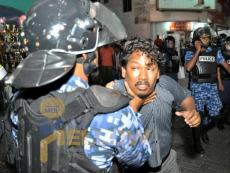Twenty four hours after police began dismantling the Maldivian Democratic Party’s (MDP) protest area – for the second time since February 7 – the party’s supporters returned to the area to hear former President Mohamed Nasheed speak.
Nasheed arrived at Usfasgandu straight from the airport, after attending a an executive meeting of the International Democratic Union (IDU) in New Zealand. Thousands of MDP supporters gathered in the remains of the camp at around 11:30pm to hear the ousted President speak.
Nasheed told his throngs of supporters that the government was now witnessing the determination of the people to regain their constitutional freedoms.
“What we are witnessing today is that the Maldivian people are not ready to give up the freedoms gained through the hard work of a lot of people,” he said.
“Maldivian people will not let go of freedom of expression, freedom of assembly and the freedom to hold peaceful political activities,” he added.
Police Sub Inspector Hassan Haneef said that the police had vacated the area at around 2:00pm yesterday. The warrant issued by the Criminal Court at 3:00pm on Monday gave the police 48 hours to complete their search of the site.
Haneef said that there had been no reported incidents following Nasheed’s speech, although he did day that two officers patrolling the area at around 3:30pm had their walkie-talkies taken from them and smashed.
The search warrant granted to police did not grant any permission to dismantle the camp, an issue that was brought to the attention of the Civil Court by the MDP. At 10:15pm, the Civil Court ordered that the dismantling be halted until it made a decision on the issue.
A police statement acknowledged receipt of the Civil Court order but added that most of the dismantling work had been carried out. An MDP statement alleged that by this time “the out-of-control police had already finished its work, leaving only a few chairs and a flagpole.”
The MDP have alleged that the police and Maldives National Defence Force (MNDF) continued their work after the court order to cease was given.
Speaking atop a pile of debris left after the police and MNDF had partially excavated the site as part of their search, Nasheed told the crowd: “The reality that the police and military officers who perpetrated the coup should know is that whether you smash us or stomp on us, we will not back down.”
“Trained in thuggery, in iron armor, carrying pepper spray and batons on the streets – this will not stop our resistance. Thuggery will not push us back.”
“Maldivian people had long been voicing against the torture they suffered, that’s why the new constitution [ratified in 2008] was the people’s constitution, and the fundamental rights that the citizens of this country found in that constitution are not something they are willing to let go of,” he exorted.
Nasheed then went on to express his confidence that 2012 would see fresh presidential elections and that the Committee of National Inquiry (CNI)’s investigations would result “in the arrest of the perpetrators of the coup”.
MDP MP Mariya Didi, party Interim Chairman Moosa ‘Reeko’ Manik, and former Spokesman for Nasheed’s Presidential Commission, Abdulla Haseen, also addressed the crowd.
Nasheed arrived at Ibrahim Nasir International Airport (INIA ) at around 10:00pm, walking to the Usfasgandu area from the harbour after briefly speaking to reporters at the airport.
Haveeru reported Nasheed as telling the press that all parties present in the Wellington talks were supportive of early elections in the Maldives.
Asked about the Usfasgandu issue, Nasheed reportedly responded: “desperate times call for desperate measures.”
“Humans tend to resort to heavy handed tactics when times are desperate. It is a flaw which is quite disappointing,” he lamented.
“I hope that civilised measures would be restored where issues would be resolved by peaceful means,” he said.
Nasheed spoke to the IDU’s executive committee about the current political situation in the Maldives. He also met with the IDU member group the Asian Pacific Democratic Union (APDU).
The Commonwealth’s Special envoy to the Maldives, Sir Donald McKinnon, was also present at the IDU meeting.
During the visit, Nasheed also discussed the Maldives’ political situation with officials from New Zealand’s Ministry of Foreign Affairs.

